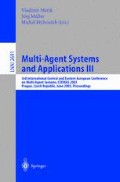Abstract
Game theory has been widely used in modelling interactions among autonomous agents. One of the most oft-studies games is the iterated prisoner’s dilemma. Prevalent assumptions in the majority of this work have been that no noise is present and that interactions and gestures by agents are interpreted correctly. In this paper, we discuss two classes of strategies that attempt to promote cooperation in noisy environments. The classes of strategies discussed include: forgiving strategies which attempt to re-establish mutual cooperation following a period of mutual defection; and memory-based strategies which respond to defections based on a longer memory of past behaviours. We study these classes of strategies by using techniques from evolutionary computation which provide a powerful means to search the large range of strategies’ features.
Access this chapter
Tax calculation will be finalised at checkout
Purchases are for personal use only
Preview
Unable to display preview. Download preview PDF.
References
Dugatkin, L. A.: Do Guppies Play TIT FOR TAT during Predator Inspection Visits? Behavioral Ecology and Sociobiology 2 (3), (1987) 395–399
Dugatkin, L.A.: N-person Games and the Evolution of Co-operation: A Model Based on Predator Inspection in Fish. Journal of Theoretical Biology 142, (1990) 123–135
Lombardo, M.: Tree Swallows and TIT FOR TAT: Response to Koenig. Ethology and Sociobiology 11, (1990) 521–528
Bendor, J., Mookherjee, D.: Institutional Structure and the Logic of Ongoing Collective Action. American Political Science Review 81, (1987) 129–154
Sober, E.: Stable Cooperation in Iterated Prisoner’s Dilemmas. Economics and Philosophy 8, (1992) 127–139
Sen S.: Reciprocity: A foundational principle for promoting cooperative behavior among self-interested agents. Proceedings of the First International Conference on Multi-Agent Systems”, (1995) MIT Press, (ed. Victor Lesser)
Bazzan A., Bordini R.: Evolving Agents with Moral Sentiments in an Iterated Prisoner’s Dilemma Exercise. 2nd Workshop on Game Theoretic and Decision Theoretic Agents (2000)
Gmytrasiewicz P., Lisetti, C.: Using Decision Theory to Formalize Emotions in Multi-Agent Systems. Proceedings of the 4th International Conference on Multi-Agent Systems 2000, 391–392, Boston, MA
Bendor, J., Kramer, R. M., Stout, S.: When in Doubt Cooperation in a Noisy Prisoner’s Dilemma. Journal of Conflict Resolution 35, (4), (1991) 691–719
Kahn, L.M., Murnighan, J.K Conjecture, uncertainty, and cooperation in prisoner’s dilemma games: Some experimental evidence. Journal of Economic Behaviour & Organisation 22, (1993), 91–117
Miller, J.H.: The coevolution of automata in the repeated prisoner’s dilemma. Journal of Economic Behaviour & Organisation”, 29, (1996), 87–112
Mueller, U.: Optimal Retaliation for Optimal Cooperation. Journal of Conflict Resolution 31, 4, (1988), 692–724
O’Riordan, C.: A forgiving strategy for the Iterated Prisoner’s Dilemma. Journal of Artificial Societies and Social Simulation 4, 3 (2002)
O’Riordan, C.: Forgiveness in the Iterated Prisoner’s Dilemma and Cooperation in Multi-Agent Systems. UK Multi-Agent Systems Workshop, (eds. Mike Luck and Mark d’Inverno) 4, (2001)
Axelrod R.: The Evolution of Cooperation. (1984) Basic Books, New York
Hoffman R.: Twenty Years on: The Evolution of Cooperation Revisited. Journal of Artificial Societies and Simulation 2, 3, (2000)
Fundunberg D., Maskin E.: Evolution and Cooperation in Noisy Repeated Games. The American Economic Review 80, 2, (1990), 274–179
Author information
Authors and Affiliations
Editor information
Editors and Affiliations
Rights and permissions
Copyright information
© 2003 Springer-Verlag Berlin Heidelberg
About this paper
Cite this paper
O’ Riordan, C., Griffith, J., Sorensen, H. (2003). Forgiveness in Strategies in Noisy Multi-agent Environments. In: Mařík, V., Pěchouček, M., Müller, J. (eds) Multi-Agent Systems and Applications III. CEEMAS 2003. Lecture Notes in Computer Science(), vol 2691. Springer, Berlin, Heidelberg. https://doi.org/10.1007/3-540-45023-8_33
Download citation
DOI: https://doi.org/10.1007/3-540-45023-8_33
Published:
Publisher Name: Springer, Berlin, Heidelberg
Print ISBN: 978-3-540-40450-7
Online ISBN: 978-3-540-45023-8
eBook Packages: Springer Book Archive

